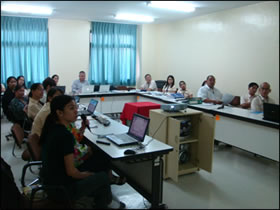Success Story #4
CAREID Helps Develop Laboratory Networks in South-East Asia
For over a year, the Canada-Asia Regional Emergency Infectious Diseases (CAREID) project has been promoting the efficacy of networking among community laboratories in South-East Asia as part of the CAREID project's goals to strengthen capacity in the detection, identification and reporting of emerging infectious diseases. CAREID is a project led by the Public Health Agency of Canada (PHAC) and funded by the Government of Canada through the Canadian International Development Agency (CIDA).
As signatories to the World Health Organization's International Health Regulations (IHR), Member States are expected to provide timely reporting on emerging diseases that are of international public health concern. However, laboratories within the different Member States have different strengths and weaknesses in basic microbiology, diagnostic testing and technologies, quality control and biosafety. Through an active laboratory network, individual laboratories can share their expertise and thereby improve the overall quality of practice, such as: accuracy of laboratory diagnostic testing, laboratory surveillance, risk assessment and response, specimen referral systems and laboratory biosafety. Such an initiative can enhance public health laboratory capacity to meet emergency infectious disease management requirements.

Laboratory Network Development at the
Research Institute of Tropical Medicine (RITM)
in the Philippines.
In the Philippines, in partnership with the Research Institute of Tropical Medicine (RITM), CAREID developed a comprehensive work plan that ties together nine disease-specific networks. In accomplishing this network, more advanced laboratories provide support to laboratories with more limited capacities. By connecting these vertical networks horizontally, broad-based training and quality assurance is coordinated in a more streamlined fashion.
The enhanced laboratory network will increase the ability of public health laboratories to address infectious diseases affecting the population of the Philippines; fill gaps in providing scientific-evidence for decision-making, regulation, and policy; and help the country to meet their IHR requirements.
As a result of the work in the Philippines, the Laboratory Networking Technical Lead, Dr. Theodore Kuschak received a request from Cambodia to assist with the development of their public health laboratory network. The Ministry of Health in Cambodia was pleased to announce the implementation of their country's National Medical Microbiology Laboratory Network.